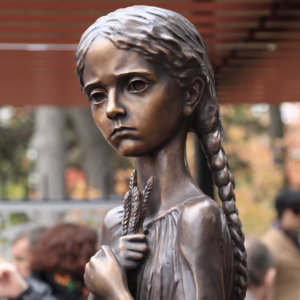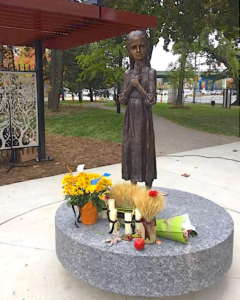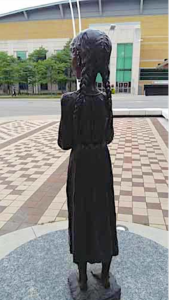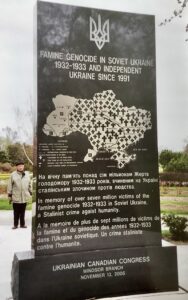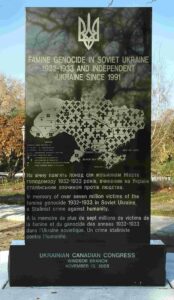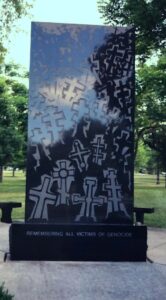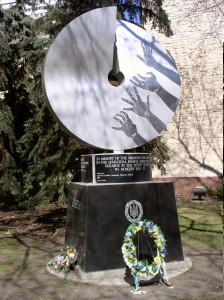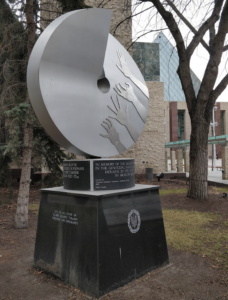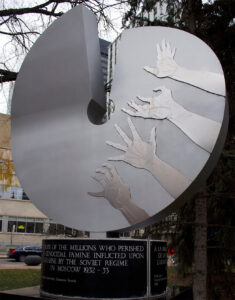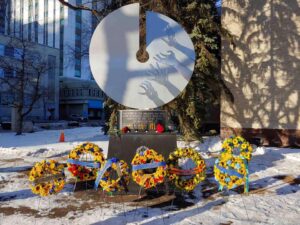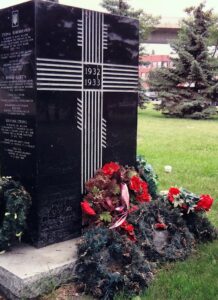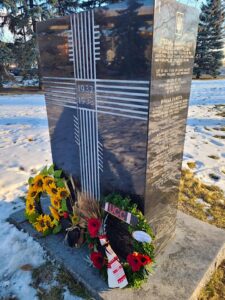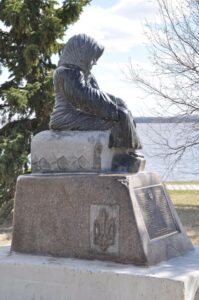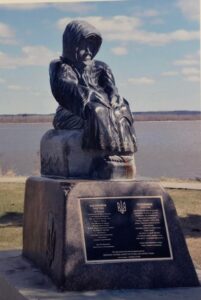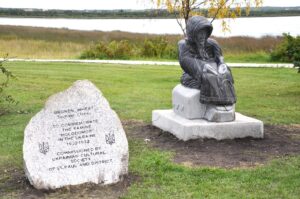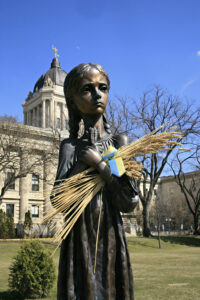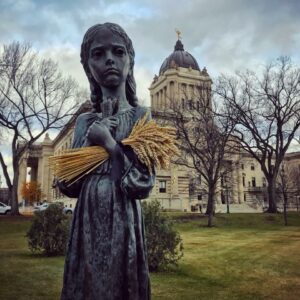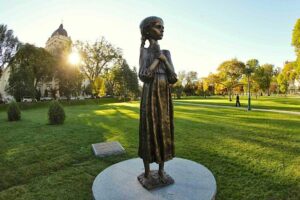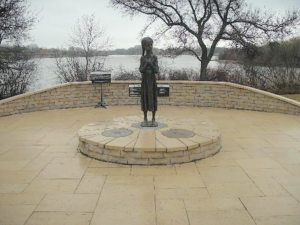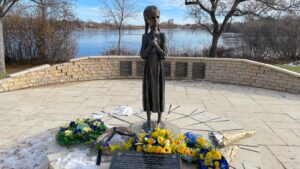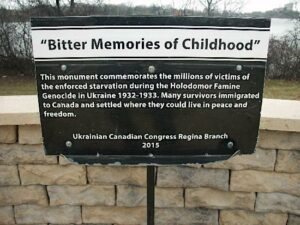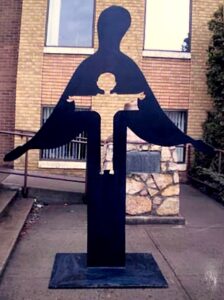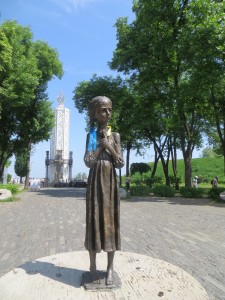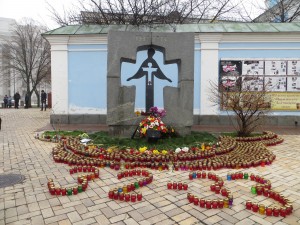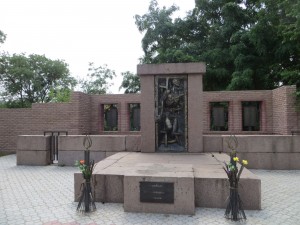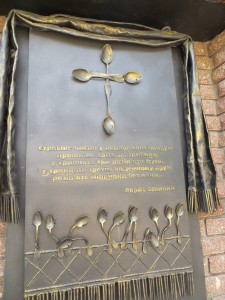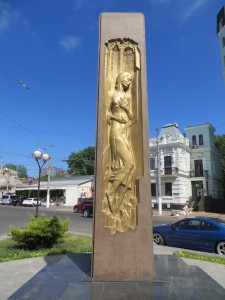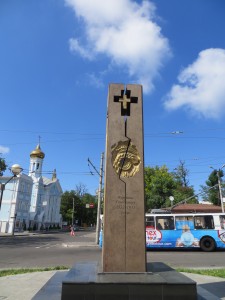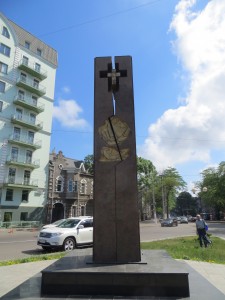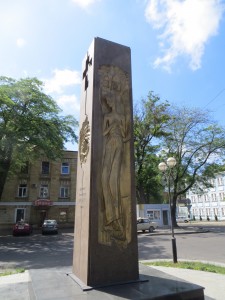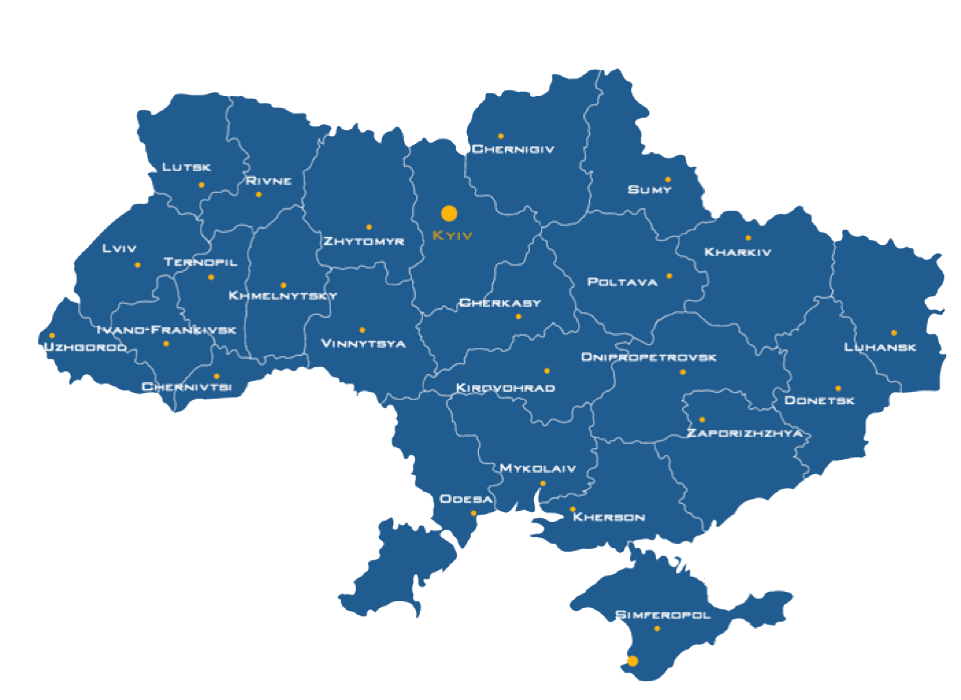Holodomor Monuments in Canada
In 2013 on the 80th anniversary of the Holodomor, Prime Minister, Stephen Harper issued the following statement;
“Tomorrow Canadians and people around the world will pause to remember the millions of men, women and children who perished during the Ukrainian Famine-Genocide of 1932-1933, an atrocity perpetrated by Joseph Stalin’s communist regime.”
– Prime Minister, Stephen Harper. From a statement made on the 80th anniversary of the Holodomor in 2013.
From 1932 to 1933, millions of Ukrainians starved to death in a genocide known as the Holodomor. The Holodomor was perpetrated by policies enacted by the government of the Soviet Union, under the leadership of Joseph Stalin and his regime, against the population of Ukraine.
Toronto Holodomor Memorial
The Toronto Holodomor Memorial was unveiled and dedicated in October of 2018 in remembrance of the 85th anniversary of the Holodomor. It is located in the Holodomor Memorial Parkette, just inside the entrance of the Exhibition Place grounds. The Toronto memorial is comprised of Ukrainian sculptor Petro Drozdovsky’s iconic Bitter Memory of Childhood bronze monument, set on paving stones that suggest traditional embroidery, from which a winding pathway leads to 3 millstones in the parkette. The 3 Millstone Gardens, represent themes of Remembrance, Resilience and Renascence. These provide a narrative of the Holdomor and its legacy, with links to information and resources through scannable QR codes sited in each garden. Ornamental screens created by artists Anastasia Zaiats, Brad Emsley, and Rhonda Weppler further interpret each theme in the gardens. Seating and sheltered areas create a space to hold informative class field trips or for rest and contemplation.
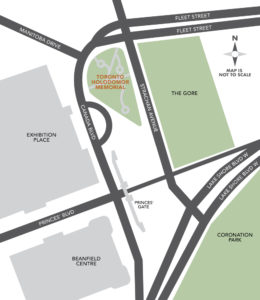 The Holodomor Memorial Parkette was created to convey the value of remembrance alongside concepts relating to humanism, tolerance, democracy, civil society and the defence of human rights. The natural and spiritual ecologies are also emphasized in the Memorial – in essence, all the life-affirming responses to the evils of the Holodomor and other atrocities. While exploring the route, visitors can reflect on the full horror of the Holodomor, feel the despair and helplessness and arrive at a place of peace. It was created as a space of memory, learning and respect for the tragic periods and moments in our histories. Memorial ceremonies are held here annually on the fourth Saturday of every November; these take place simultaneously at all of the Holodomor monuments globally.
The Holodomor Memorial Parkette was created to convey the value of remembrance alongside concepts relating to humanism, tolerance, democracy, civil society and the defence of human rights. The natural and spiritual ecologies are also emphasized in the Memorial – in essence, all the life-affirming responses to the evils of the Holodomor and other atrocities. While exploring the route, visitors can reflect on the full horror of the Holodomor, feel the despair and helplessness and arrive at a place of peace. It was created as a space of memory, learning and respect for the tragic periods and moments in our histories. Memorial ceremonies are held here annually on the fourth Saturday of every November; these take place simultaneously at all of the Holodomor monuments globally.
Windsor, Ontario
The Holodomor monument in Windsor, Ontario was unveiled on 13 November 2005 and sits in the City of Windsor’s Jackson Park in the Queen Elizabeth II Gardens. It is made of granite (approximately 305 x 120 x 30 centimetres), etched on both sides, and on its west face in Ukrainian, English and French. According to the city, the monument weighs more than 4,500 kg. Its dedication is in English, French and Ukrainian languages and states: “In memory of over seven million victims of the famine genocide 1932-1933 in Soviet Ukraine, a Stalinist crime against humanity.” On its base is etched: “Remembering All Victims of Genocide.”
Mississauga, Ontario
Memorial at the Dormition of the Mother of God Ukrainian Catholic Church.
Etobicoke, Ontario
 In Etobicoke at St. Demetrius Ukrainian Catholic Church.
In Etobicoke at St. Demetrius Ukrainian Catholic Church.
Oshawa, Ontario
Hawkestone, Ontario
 Holodomor Commemoration at Camp Sokil in Hawkestone, Ontario at Ukrainian National Federation’s summer camp (16 Taras Blvd, Hawkestone, ON L0L 1T0).
Holodomor Commemoration at Camp Sokil in Hawkestone, Ontario at Ukrainian National Federation’s summer camp (16 Taras Blvd, Hawkestone, ON L0L 1T0).
The Ukrainian National Federation of Canada
Edmonton, Alberta
The first public monument to the Holodomor in Canada, created by Ukrainian Canadian artist Ludmilla Temertey, was unveiled in 1983, on the 50thanniversary of the Holodomor. It is located in front of Edmonton, Alberta’s City Hall.
The opening of the Edmonton monument was attended by 8,000 people. Premier Lougheed, flanked by University of Alberta Chancellor Dr. Peter Savaryn, declared at it; “We, in Alberta, will never allow this tragic event, committed by a totalitarian regime, to ever be forgotten.”
- Edmonton Arts Council Public Art Collection page
- The Ukrainian Weekly article
- National Post article
- UCRDC Interview with the artist
Calgary, Alberta
Calgary’s Holodomor monument, created by Ihor Novosilets, was erected in 1999 on City of Calgary parkland near Memorial Drive at Edmonton Trail, in northeast Calgary, Alberta.
The dedication reads:
“Eternal Remembrance. In memory of many millions of Ukrainians who perished in the genocidal great famine inflicted upon Ukraine by the Soviet Regime 1932-1933. Let us all stand on guard against tyranny, violence and inhumanity.”
Echoes of Ukraine video of the unveiling of this monument
St. Paul, Alberta
The Holodomor monument in St. Paul, Alberta, created by local artist Stephen Yettaw, is titled Broken Wheat. It was commissioned by the Ukrainian Cultural Society of St. Paul and District and is located by St. Paul Lake.
Its inscription reads:
“To commemorate the famine Holodomor in the Ukraine 1932-1933.”
Winnipeg, Manitoba
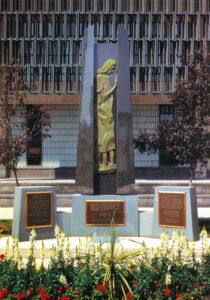
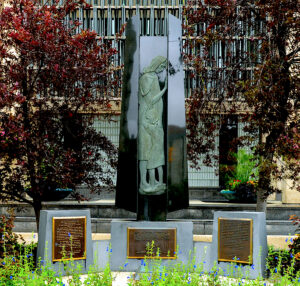 The Winnipeg Holodomor monument was unveiled on 24 June 1984 to commemorate the 50th anniversary of the Famine-Genocide in Ukraine and is located in front of Winnipeg’s City Hall. It was conceived and erected by noted Canadian sculptor Roman Kowal. Fifteen feet high and composed entirely of black granite, except for the central image of mother and child which is cast in bronze. The materials were chosen to complement the existing City Hall buildings. Three bronze plaques in English, Ukrainian and French are located at the base of the monument
The Winnipeg Holodomor monument was unveiled on 24 June 1984 to commemorate the 50th anniversary of the Famine-Genocide in Ukraine and is located in front of Winnipeg’s City Hall. It was conceived and erected by noted Canadian sculptor Roman Kowal. Fifteen feet high and composed entirely of black granite, except for the central image of mother and child which is cast in bronze. The materials were chosen to complement the existing City Hall buildings. Three bronze plaques in English, Ukrainian and French are located at the base of the monument
- Ukrainian Canadian Congress-Manitoba Provincial Council page
- Wikipedia
- Manitoba Historical Society
- One person’s reflections of the monument
Winnipeg, Manitoba
A second Holodomor monument was unveiled in Winnipeg on 21 September 2014 on the grounds of the Manitoba Legislative Building, near the monument to Taras Shevchenko. Entitled, “Bitter Memory of Childhood” («Гіркий спогад дитинства») it is a replica sculpted by Ukrainian artist Petro Drozdovsky in Ukraine.
Ukrainian Canadian Congress-Manitoba Provincial Council page
Regina, Saskatchewan
The Holodomor monument in Regina, Saskatchewan was unveiled in spring of 2015 at the Wascana Centre Park southeast of the Legislative Building on Lakeshore Drive, on the shore of Wascana Lake. It is a copy of the iconic life size bronze statue by Ukrainian sculptor Petro Drozdowsky. Saskatchewan was the first jurisdiction in North America to recognize the genocide with the passing of The Ukrainian Famine and Genocide (Holodomor) Memorial Day Act in 2008.
Battleford, Saskatchewan
In North Battleford, Saskatchewan, a different Holodomor monument was unveiled and dedicated in 2014 at the Flag and Cultural Corridor, on the Riverview Walk. This monument is a replica of the Monument to the Victims of the 1932-33 Famine in St. Michael’s Square in Kyiv, Ukraine, but built in 2008 by local artist Vasyl Polishchuk with assistance from Sergii Murai and exhibited at City Hall. Polishchuk immigrated to Canada in 2007. The monument is made of steel and is approximately 3 metres by 1.5 meters (10′ x 5′).
SASK TODAY article
The First Monument to the Holodomor
St. Andrew Memorial Church at Bound Brook, New Jersey was planned by the prominent architect Yurii Kodak. The church was to be a symbol of Ukrainian church architecture, built in the Ukrainian baroque style. In 1963, the marking of the thirtieth anniversary of the Great Famine at Bound Brook was attended by thousands of participants.
More photos and information
- https://www.uocofusa.org/news_181006_2
- https://subscription.ukrweekly.com/1983/03/st-andrews-memorial-church-monument-to-famine-victims/
Holodomor Monuments in Ukraine
Kyiv
This commemoration statue is known as Bitter Memory of Childhood and is located in Kyiv, it’s part of a larger complex and museum that commemorates the Holodomor, the Memorial in Commemoration of Famines’ Victims in Ukraine. It was established in 2008, on the 75th anniversary of the Holodomor and sees around half a million visitors every year.
Kyiv
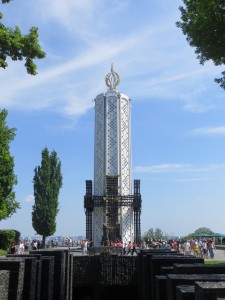 This is the museum located in Kyiv Ukraine that commemorates the Holodomor, the Memorial in Commemoration of Famines’ Victims in Ukraine. It was established in 2008, on the 75th anniversary of the Holodomor and sees around half a million visitors every year.
This is the museum located in Kyiv Ukraine that commemorates the Holodomor, the Memorial in Commemoration of Famines’ Victims in Ukraine. It was established in 2008, on the 75th anniversary of the Holodomor and sees around half a million visitors every year.
Kyiv
This is the first monument to the Holodomor in Kyiv. The monument was part of a special commemoration held for the Holodomor’s 80th anniversary in Kyiv Ukraine.
Kherson, Southern Ukraine
These photos are of a monument that stands in commemoration of the Holodomor in Kherson, Southern Ukraine.
Odesa
These photos are of a monument that stands in commemoration of the Holodomor in Odesa (Black Sea port), Ukraine.
Holodomor Monuments in Ukraine: An Interactive Map
To see the Holodomor monuments, please click on the circles in each province (oblast) on the map (website created by the Ukrainian Canadian Research and Documentation Centre).
